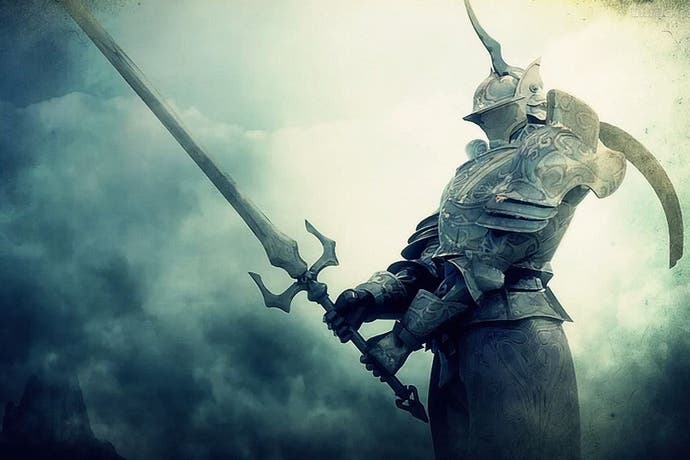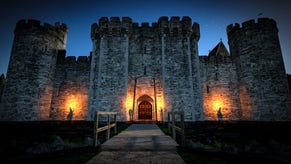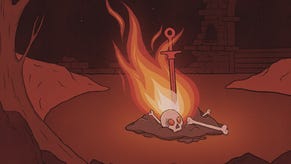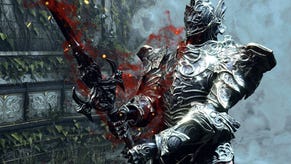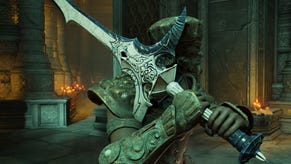Demon's Souls retrospective
I can't take this.
Demon's Souls was never about winning, but learning how to fail. I'd spent most of the latter half of the noughties clocking up more game completions than the previous 25 years put together, and few of them really lingered in the memory that long. By 2009, it seemed like most games were almost designed to play themselves. Most of them were all mouth and no trousers, and it was making me lose interest. I do love my trousers.
My introduction to Demon's Souls came, rather appropriately, in a darkened Japanese hotel room a few weeks after the game came out. On a dutiful excursion to visit my girlfriend, I spent a fraught evening observing her pitiful progress, watching flying Manta Rays ejaculating giant crystal spears into her frail warrior, and enduring terrified yelps as something utterly horrendous emerged from the blackness to eviscerate her once again. It was painful to endure so much relentless failure - and yet my interest was piqued.
Lumping it with the JRPG scene was doing it a disservice; Demon Souls was a completely different beast. I'd been an editor on one publication or another for nearly ten years at that point, reviewed hundreds of games and had never seen anything like it. Spiritually it was in line with From Software's long-abandoned King's Field series, but to my mind, the stark miserabilism and relentless cloying tension placed it closer to survival horror. Albeit one with a fearsomely skilful combat engine and a feast of statistical elements to wrap your head around; things I would normally hurl myself under the nearest train to avoid.
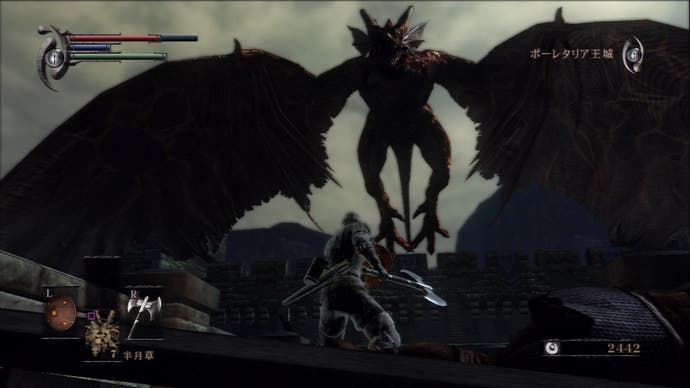
I couldn't work out for the life of me how this unique game had arrived fully formed from absolutely nowhere. In an era of coordinated multinational hype machines, here was a landmark PS3 exclusive, published by Sony Computer Entertainment, that few people seemed to care about. There were no plans to release it in the West, and seemingly no appetite to do so.
Even in Japan, the response was mixed. The infamously generous (in)Famitsu scored it a disastrous 29/40, and initial sales of 40k were mediocre to say the least. But in a move of incredible foresight on From Software's part, the version released for the Asian/Chinese market was fully localised in English, and, of course, region-free. This version instantly became hot property, and copies were soon changing hands on eBay for as much as £70 at one point. It was the first time I'd had to import a game in yonks, but it seemed well worth it to get hold of a copy I could have a vague hope of understanding.
But the grim reality was that the game was still completely impenetrable in English. The user interface, with its abstract symbols, was a total disaster. You needed a guide book just to figure out what the sodding menus meant, and at that point, there wasn't one - and certainly no helpful wikis or YouTube videos. The fact that you couldn't even level up until you'd beaten the gelatinous oozing Phalanx boss wasn't explained, and the perpetual loss of any souls upon your inevitable death heaped sorrow on misery.
The choice was to muddle your way through, or wait months for the guides to appear in the wake of the belated US release. In my case, I battled on in a rather feeble fashion and elected to throw everything into building the best mage I could. Ranged attacks, I reasoned, were the game's Achilles heel. I figured if they couldn't touch me, they couldn't hurt me, and I'd merrily chip away at the health of most enemies from a position of safety.
But if there's one thing that From Software likes to expose, it's cowardliness. Eventually, it's becomes a mandatory requirement to get your hands dirty and learn how to play the game properly; the tricky parry and riposte combo, the sneaky backstabs, and getting a handle on using the best gear for any given situation. Playing Demon Souls felt like an education in gameplay systems.
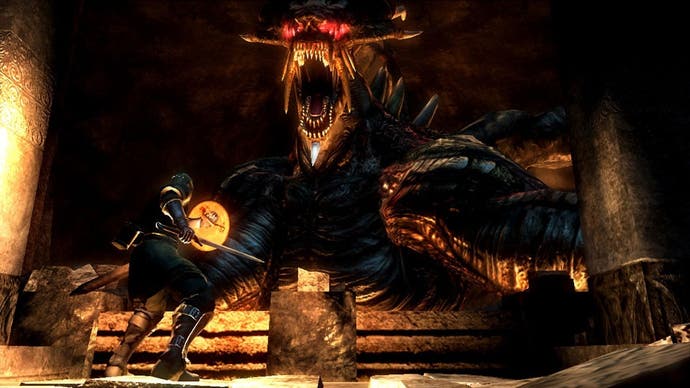
One of those systems, it turned out, was perhaps the most poorly explained of all - that of phantoms, black or otherwise. In these days of Souls enlightenment, most of us are now fully versed in the importance of calling on others for help, and are well-drilled in the principles of humanity, and when, where and how to make the magic happen. But five years ago, it seemed like a mystical rumour.
Most of the time, you simply had to put up with fighting in 'hollow' form with reduced health, and the only evidence of player involvement was the sight of ghostly apparitions wandering around, or some helpful orange messages written on the floor. The process of getting players to join your game wasn't at all clear, and even when you did get it to work, you couldn't choose who entered your game, or communicate with them. The process was so alien, but when it worked, the sight of some badass entering the fray in crazy armour and a sword the size of a light aircraft was thrilling.
Suddenly, all those stressful sections and hellish near-miss encounters became a relative cakewalk, and the penny dropped. This was how From wanted us to play the game. It wasn't meant to be played alone. The penny dropped: Demon's Souls was a radical single player MMO of sorts, with its nightmarish invasions a particularly traumatic form of PvP. Now and then you'd find yourself uttering out loud to designers who couldn't hear you: "Well, why didn't you just say so!"
So much of what made Demon's Souls such a radical step forward for action games seemed to be deliberately designed to be as unintuitive as possible. When you're used to being spoon-fed by games for three consecutive gaming generations, it's one hell of a trip to suddenly go back to the kind of approach last seen in the 1990s. If that sounds like whiny criticism, it isn't meant to be. I extracted perverse satisfaction and immersion from negotiating its labyrinthine systems, and rising to its vertiginous challenges. It's the kind of game where there's a direct correlation between the time invested and the enjoyment gained.
Normally I'm glad when a game's credits roll. I can mentally cross it off the list and move on to something fresh and exciting, but Demon's Souls more or less ruined video games for me for a long time. Once you've surrendered yourself so completely to a game as rich and mentally involving as this, the regular 'popcorn' video game seems vapid, trivial and, dare I say it, hollow. Like a cheap pop hook next to a slow-burn album of grand ambition that you'll treasure for life.

But having just finished Dark Souls 2, it's fascinating to return to Demon's Souls years later to see how much has changed. In your head, there's not that much difference, but you forget just how brutal it really was. The reduction of your health to half upon death. The petty weight limit of your inventory. Having to run back to the Nexus hub area just to level up. Starting at the beginning of the level each time with all the enemies respawned. The godawful camera and errant lock-on. The ability to accidentally kill vitally important NPCs.
You get over that. Eventually. If, for whatever reason, you played either Dark Souls title, but never got around to Demon's Souls, the chances are you'll get on with it just fine. Most of the systems are the same, and a lot of the battle-scarred experience learned from Dark will help enormously. In most senses, it hasn't aged a day. Its breathtaking scale and forward-looking ambition make it feel as fresh now as it did five (yes, really) years ago.
It's not for everyone, but Demon's Souls was an important game. It not only changed the way a lot of us think about video games, but managed to jolt a lot of us out of our collective torpor and made us better players again. Skill and persistence once again became a prerequisite to enjoyment, and it showed up the cheap thrills and visual showboating of the time for what it really was.
That's not to downplay Demon's Souls visual merit. If the cinematics, the bosses and environmental design don't knock you for six, it might be best to check your pulse: you're probably dead. But don't worry, Demon's Souls welcomes the hollow too. You just have to work hard to regain your humanity.
